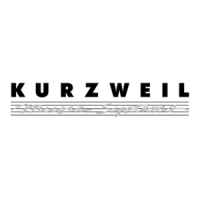SysEx Control of KDFX
SysEx Message Structure
B-1
Appendix B
SysEx Control of KDFX
Any KDFX parameter that can be set to a destination of FXMod can also be controlled by MIDI
system exclusive (SysEx) messages. This takes a little more effort, but allows more flexibility. It’s
especially useful when the K2661 is in Master effects mode (the FX Mode parameter on the
Effect-mode page is set to Master). It’s also a way to get additional real-time control—beyond
the 18 FXMods that are available for a given program or setup.
Note that using SysEx control temporarily disables FXMod control for the corresponding
parameter. For example, if a studio’s Mix level is controlled by an FXMod, then you send a
SysEx message to change it, the FXMod that was controlling the Mix level is disabled, and won’t
take effect again until the program or setup containing the FXMod gets selected.
You’ll find general information about the K2661’s SysEx implementation in Chapter 7.
SysEx Message Structure
A standard SysEx message is a string of hexadecimal numerals, each of which represents a byte
of MIDI data ranging in value from 0 to 127—for example 2A, which represents the decimal
numeral 42: (2 x 16) + 10). The hexadecimal numerals correspond to particular SysEx
commands. Many of these commands are standardized by the MIDI Specification. Others are
assignable by individual manufacturers.
Every SysEx command consists of three basic parts: header, body, and end. The header includes
general data, like where the message is intended to go, and what type of message it is. The body
issues the specific commands you want to send, and the end simply indicates that the SysEx
message is finished.
Header
The following table provides the header information required for sending a KDFX-control SysEx
message to the K2661.
Every KDFX-control SysEx message you send to the K2661 must start with this string of
numerals. This lets the K2661 know that the remainder of the message contains specific KDFX-
control instructions.
Hexadecimal
Value
Corresponding
Decimal Value
Corresponding SysEx Command
F0 240 Start of SysEx message
07 7 Manufacturer ID (7 is Kurzweil/Young Chang)
00 00 Unit ID; if you’re sending SysEx from the same source to multiple
K2661s, use a different ID value for each one
78 120 Product ID (78 is K2000/K2500/K2600/K2661)
1B 27 Message type (1B is KDFX control)

